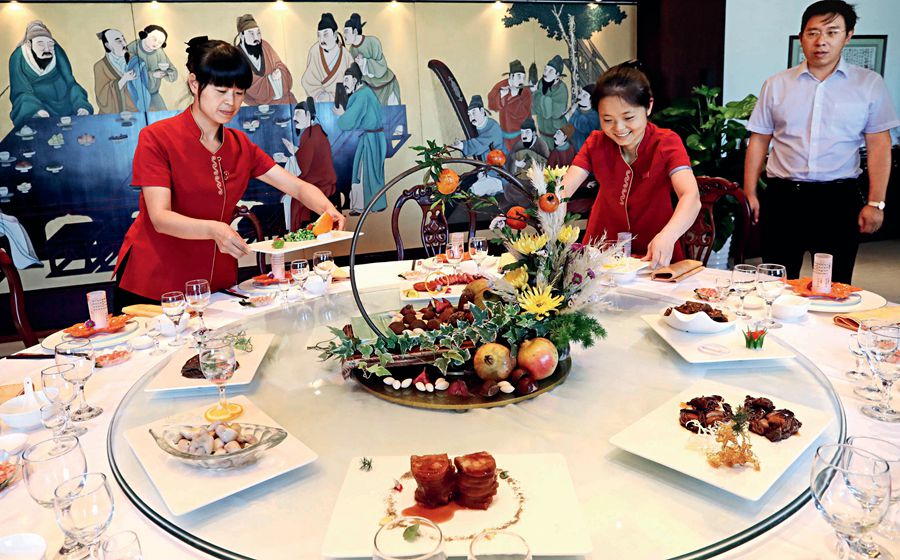PEOPLE in Suzhou of Jiangsu Province are quite enthusiastic when it comes to anecdotes of cuisine, from its origins to the style in which it is cooked and eaten. In the northwest part of the old town of Suzhou is a street called Shantang. It links the bustling downtown district of Changmen on one side with the Huqiu Mountain Scenic Area on the other side. With its branch roads stretching out in all directions, the street is famous for a variety of cuisine selections.
Since the Tang Dynasty (618-907), it has been the commodity distribution center and a gathering place of businessmen from all over the country. During the reign of Emperor Qianlong in the Qing Dynasty (1644-1911), a renowned artist Xu Yang created the painting, Prosperous Gusu (another name of Suzhou), in which he depicted a tiny village, a small town, an ancient city and a popular street of Suzhou — that street was Shantang, a flourishing market place at that time.

The Jiangnan (South China) Banquet.
Suzhou Cuisine is one of the eight major schools of China’s culinary art. Though a minor branch of delicacies in Jiangsu Province, it enjoys a good reputation along the middle and lower reaches of the Yangtze River.
Suzhou Cuisine is renowned for its geographic features and numerous historical allusions. For example, the Jiangnan (South China) Banquet was born during Emperor Qianlong’s southern tour, and is a combination of the imperial cooking style and local Suzhou food; the Xishi Banquet’s name was derived from one the Four Beauties of ancient China, and the Taihu Lake Boat Dishes were typical dishes for water towns south of the Yangtze River. The raw ingredients are mainly taken from local rivers, lakes, and the sea, and with its exquisite preparation techniques and varied cooking methods, Suzhou Cuisine preserves original flavors, maintains freshness and mildness along with versatility. Dish styles are exquisite and elegant, combining a fine appearance with good quality.
When selecting dishes to serve guests, shelled fresh shrimps are at the top of the list for Suzhou locals. Adept at eating shrimp, local people place the whole shrimp in their mouths, suck the juice and relish the flavors, skillfully eat the meat with the help of their tongue, and then spit out the shells. Tender shelled shrimp meat can be cooked into a variety of delicacies. Sautéed shelled shrimps are fresh and tender; shrimps garnished with sweet-scented osmanthus in autumn have a faint but pleasant aroma; and green peppers cut into the shape of buckets filled with sautéed shrimps look like white pearls dotted in emerald jade cups.
In writer Lu Wenfu’s novella Gourmet, he vividly describes an exquisite Suzhou dish called the “pearl agate box.” To prepare this dish, you cut off the top third of a tomato, remove the flesh in the center, fill it in with sautéed shrimp, and then place the tomatoes onto a snow-white porcelain plate. The well prepared dish looks just like a red agate box piled with pearls. This is a good example of the cultivated lifestyle of Suzhou locals’ daily life.
Local Suzhou families eat four kinds of pork dishes during different seasons throughout the year: Suzhou-style cherry pork for spring, steamed pork wrapped in lotus leafs for summer, braised pork for autumn, and stewed meat chunks in soy sauce for winter. Even for those well-mannered Suzhou foodies, the last dish is irresistible as the pork is a good balance of fatty and lean meat, crispy but not greasy, and it can be easily cut into pieces and eaten with chopsticks.
Yangcheng Lake hairy crabs are usually made into a typical dish nicknamed, “fried crab meat steamed inside an orange.” To make this dish, flake crab meat is first placed inside the bottom of a hallowed orange to absorb the juice intermingled with wine, then crab leg meat is laid at the middle level sprinkled with vinegar, and finally crab roe are garnished on the top. The flavor will linger in your mouth for such a long time that you will never forget it.
